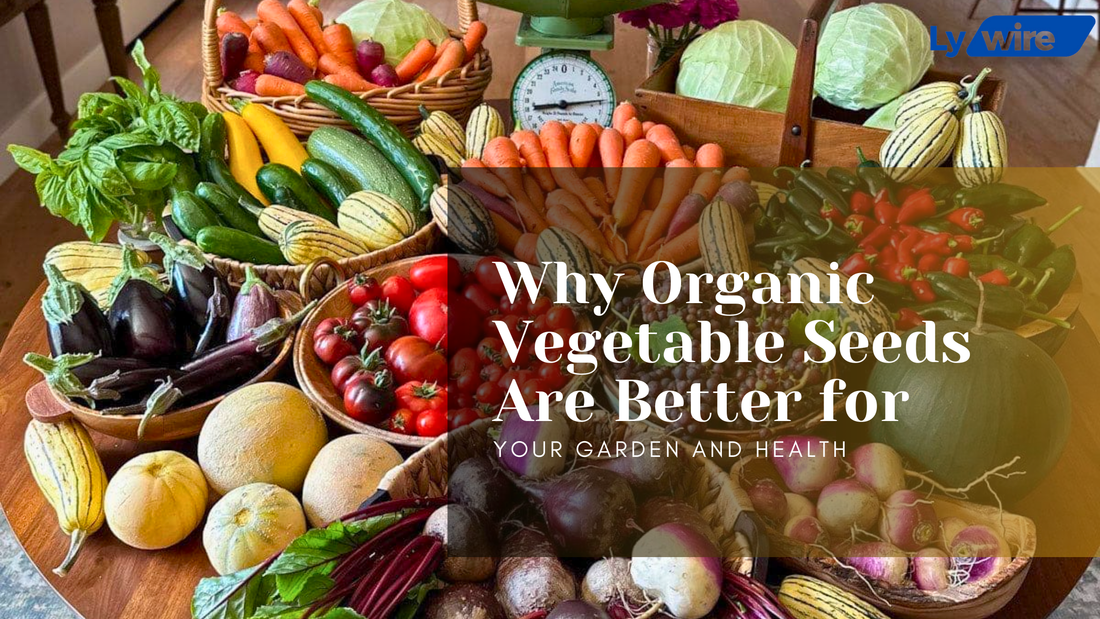
Gardening is more than just a hobby; it’s a lifestyle that promotes sustainability, health, and connection to nature. One of the most critical decisions you make as a gardener is the type of seeds you plant. Organic vegetable seeds have gained immense popularity for good reasons—they are better for your garden, your health, and the environment. In this blog, we’ll explore the many benefits of organic vegetable seeds and why they should be your top choice.
What Are Organic Vegetable Seeds?
Organic vegetable seeds are harvested from plants grown without synthetic pesticides, herbicides, or chemical fertilizers. These seeds are certified organic and are often non-GMO (genetically modified organisms). They are produced using sustainable farming practices that prioritize soil health, biodiversity, and environmental conservation.

Benefits of Organic Vegetable Seeds
1. Healthier Produce for You and Your Family
Organic seeds grow into plants that are free from harmful chemicals. Since no synthetic pesticides or fertilizers are used in their cultivation, the vegetables they produce are safer to consume. This means you can enjoy fresh, nutritious produce without worrying about ingesting toxic residues.
Moreover, organic vegetables often contain higher levels of essential nutrients like vitamins, minerals, and antioxidants compared to conventionally grown counterparts.
2. Environmental Sustainability
Organic farming practices used to produce these seeds are designed to protect the environment. By avoiding chemical inputs, organic seed production helps maintain soil fertility and promotes biodiversity. Additionally, organic farming reduces water pollution caused by chemical runoff and minimizes the carbon footprint associated with synthetic fertilizers.
3. Chemical-Free Gardening
When you plant organic seeds, you commit to a chemical-free gardening process. These seeds thrive under natural growing conditions and adapt well to organic pest control methods like companion planting or using natural predators for pest management1. This approach not only benefits your garden but also ensures that your local ecosystem remains balanced.
4. Non-GMO Assurance
One of the most significant advantages of organic seeds is that they are free from genetic modification. GMOs have raised concerns about their long-term effects on human health and the environment. By choosing organic seeds, you ensure that your garden remains a GMO-free zone.
5. Hardier Plants
Plants grown from organic seeds tend to be more resilient against pests, diseases, and harsh weather conditions. Since these plants are cultivated without chemical assistance during their growth cycle, they naturally develop stronger defenses. This results in healthier plants that require less intervention from gardeners.
6. Supporting Ethical Practices
When you purchase organic vegetable seeds, you support farmers and companies committed to sustainable agriculture. Many seed producers invest in research to improve organic farming techniques and develop new seed varieties that thrive in diverse conditions. By buying organic seeds, you contribute to advancing these eco-friendly practices.

Why Organic Seeds Are Better for Your Garden
1. Improved Soil Health
Organic farming prioritizes soil health by using natural composts and fertilizers instead of synthetic chemicals. When you grow vegetables from organic seeds, your soil benefits from increased microbial activity and nutrient retention, creating a thriving environment for future crops.
2. Biodiversity in Your Garden
Organic gardening encourages biodiversity by creating habitats for beneficial insects like bees and ladybugs. These insects play a crucial role in pollination and pest control, ensuring a balanced ecosystem within your garden.
3. Better Taste
Many gardeners report that vegetables grown from organic seeds taste better than those grown conventionally. This could be due to the absence of synthetic chemicals and the focus on natural growth processes that allow the plants to develop their full flavor profile.
How to Start an Organic Garden with Organic Vegetable Seeds
Starting an organic garden is easier than you might think! Here’s a step-by-step guide:
-
Choose Certified Organic Seeds
Look for USDA-certified organic or similar labels when purchasing your seeds to ensure they meet strict organic standards. -
Prepare Your Soil
Enrich your soil with compost or well-rotted manure to provide essential nutrients for your plants. -
Use Natural Pest Control
Employ companion planting or introduce beneficial insects like ladybugs to manage pests naturally. -
Practice Crop Rotation
Rotate crops annually to prevent soil depletion and reduce the risk of disease. -
Water Wisely
Use drip irrigation or water early in the morning to conserve water while keeping your plants hydrated. -
Harvest Mindfully
Pick vegetables at their peak ripeness for maximum flavor and nutrition.
Common Misconceptions About Organic Seeds
- "Organic Seeds Are Too Expensive"
- While organic seeds may cost slightly more upfront, they save money in the long run by reducing the need for chemical fertilizers and pesticides.
- "They Don’t Grow as Well"
- On the contrary, organic seeds often produce hardier plants that adapt better to natural growing conditions.
- "Limited Variety"The demand for organic gardening has led to an increase in seed varieties available on the market today—from heirlooms to hybrids tailored for specific climates.
Choosing organic vegetable seeds is a step toward healthier living—for yourself, your family, and the planet. These seeds offer numerous benefits: they produce nutritious food free from harmful chemicals, promote environmental sustainability, support ethical farming practices, and yield hardier plants that thrive under natural conditions.
By planting organic vegetable seeds in your garden, you’re not just growing food; you’re cultivating a healthier future for generations to come. So why wait? Make the switch today and experience the joys of truly sustainable gardening!

